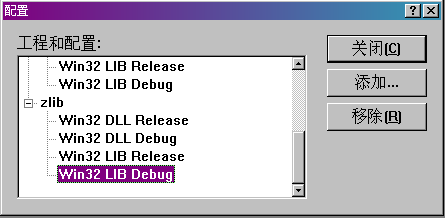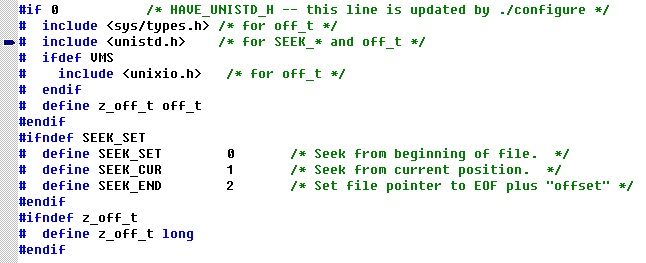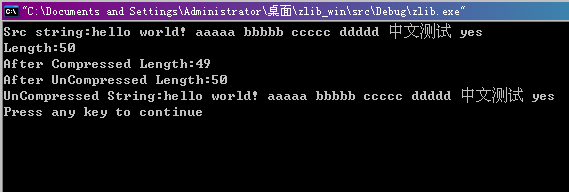zlib安装和使用 linux
2013-12-19 11:16
423 查看
zlib的安装与使用
zlib是一个很好的压缩解压缩库,今天我们分别介绍如何在Linux与Windows上安装与使用:
一:Linux平台
首先看看自己的机器上是不是已经安装好zlib了:
whereis zlib
如果安装好了,会输出zlib的路径,这样直接跳过前2步。
1.
在http://www.zlib.net/下载zlib的最新版,我的是1.2.3(官网貌似上不去,可以找别的地方下载)
2.
解压,编译:
./configure
make
sudo make install
3.
zlib安装好了,下面我们写一个程序测试一下:
Makefile:
[cpp]
view plaincopyprint?
all: test.c gcc -Wall -o test test.c -lz clean: rm -rf *.o test
注意到,我们用-lz加入了zlib库
test.c
[cpp]
view plaincopyprint?
#include <stdio.h> #include <zlib.h> int main() { /* 原始数据 */ unsigned char strSrc[] = "hello world! aaaaa bbbbb ccccc ddddd 中文测试 yes"; unsigned char buf[1024] = {0}; unsigned char strDst[1024] = {0}; unsigned long srcLen = sizeof(strSrc); unsigned long bufLen = sizeof(buf); unsigned long dstLen = sizeof(strDst); printf("Src string:%s\nLength:%ld\n", strSrc, srcLen); /* 压缩 */ compress(buf, &bufLen, strSrc, srcLen); printf("After Compressed Length:%ld\n", bufLen); /* 解压缩 */ uncompress(strDst, &dstLen, buf, bufLen); printf("After UnCompressed Length:%ld\n",dstLen); printf("UnCompressed String:%s\n",strDst); return 0; }
4.
运行结果如下所示:

呵呵,只压缩掉了一个字节。
我们用到了两个函数:compress和uncompress:
压缩:
int compress(unsigned char * dest, unsigned long * destLen, unsigned char * source, unsigned long sourceLen);
dest:压缩后数据保存的目标缓冲区
destLen:目标缓冲区的大小(必须在调用前设置,并且它是一个指针)
source:要压缩的数据
sourceLen:要压缩的数据长度
compress()函数成功返回Z_OK,如果内存不够,返回Z_MEM_ERROR,如果目标缓冲区太小,返回Z_BUF_ERROR
解压缩:
int uncompress(unsigned char * dest, unsigned long * destLen, unsigned char * source, unsigned long sourceLen);
dest:解压后数据保存的目标缓冲区
destLen:目标缓冲区的大小(必须在调用前设置,并且它是一个指针)
source:要解压的数据
sourceLen:要解压的数据长度
uncompress()函数成功返回Z_OK,如果内存不够,返回Z_MEM_ERROR,如果目标缓冲区太小,返回Z_BUF_ERROR,如果要解压的数据损坏或不完整,返回Z_DATA_ERROR。
二:Windows平台
zlib提供了用VC++6.0编译的版本,因此我们首先在Windows下编译zlib的源代码,然后再用上面的例子测试:
1.
解压zlib-1.2.3-src.zip(文末有链接),打开zlib.dsw,直接编译,提示:
'ml.exe' 不是内部或外部命令,也不是可运行的程序或批处理文件。
2.
因为ml.exe是微软的汇编编译器,我们不需要,因此:Build-->Set Active Project Configuration,将所有的带"ASM"的项都去掉,然后选择Win32 LIB Debug,如下图:

3.
在zlib classes上右键选择设为启动项目,然后再编译,出现如下错误:
fatal error C1083: Cannot open include file: 'unistd.h': No such file or directory compress.c
unistd.h是Linux下的文件,我们不需要,只要将#if 1 改为#if 0即可,如下图所示:

4.
再编译,发现出现如下4个错误:
error C2059: syntax error : 'bad suffix on number'
error C2146: syntax error : missing ')' before identifier 'L'
error C2198: 'gzseek' : too few actual parameters
error C2059: syntax error : ')'
没关系,将0LL改为0L即可(即去掉一个L),如下图:

5.
再编译,没有错误,如下图:

6.
zlib编译好后,会生成zlib1.lib和zlib1.dll两个文件,这正是我们需要的。
下面还是用之前的测试程序:
新建一个VC++6工程,加入如下的代码,并将zlib1.dll拷贝到项目目录下:
[cpp]
view plaincopyprint?
#include <stdio.h> #include "../zlib/include/zlib.h" #pragma comment(lib, "../zlib/lib/zlib1.lib") int main() { /* 原始数据 */ unsigned char strSrc[] = "hello world! aaaaa bbbbb ccccc ddddd 中文测试 yes"; unsigned char buf[1024] = {0}; unsigned char strDst[1024] = {0}; unsigned long srcLen = sizeof(strSrc); unsigned long bufLen = sizeof(buf); unsigned long dstLen = sizeof(strDst); printf("Src string:%s\nLength:%ld\n", strSrc, srcLen); /* 压缩 */ compress(buf, &bufLen, strSrc, srcLen); printf("After Compressed Length:%ld\n", bufLen); /* 解压缩 */ uncompress(strDst, &dstLen, buf, bufLen); printf("After UnCompressed Length:%ld\n",dstLen); printf("UnCompressed String:%s\n",strDst); return 0; }
和之前的程序类似,只多了#pragma comment,这里需要填入zlib1.lib的正确路径
然后运行,一切正常,如下图:

呵呵,我们发现同样的字符串在Linux和Windows上长度是不一样的!
另外还要说的是我们编译的VC++6.0版的zlib工程中包含一个example示例程序,可以参考参考。
为了方便大家,本文的所有源码都可以下载:
http://download.csdn.net/detail/htttw/4340134
下面是网上摘录的zlib的其他重要函数:
关键的函数有那么几个:
(1) int compress2 (Bytef *dest, uLongf *destLen,const Bytef *source, uLong sourceLen,int level);
功能和上一个函数一样,都一个参数可以指定压缩质量和压缩数度之间的关系(0-9)不敢肯定这个参数的话不用太在意它,明白一个道理就好了: 要想得到高的压缩比就要多花时间
(2) uLong compressBound (uLong sourceLen);
计算需要的缓冲区长度. 假设你在压缩之前就想知道你的产度为 sourcelen 的数据压缩后有多大, 可调用这个函数计算一下,这个函数并不能得到精确的结果,但是它可以保证实际输出长度肯定小于它计算出来的长度
(3) deflateInit() + deflate() + deflateEnd();
3个函数结合使用完成压缩功能,具体用法看 example.c 的 test_deflate()函数. 其实 compress() 函数内部就是用这3个函数实现的(工程 zlib 的 compress.c 文件)
(4) inflateInit() + inflate() + inflateEnd()
和(5)类似,完成解压缩功能.
(5) gz开头的函数.
用来操作*.gz的文件,和文件stdio调用方式类似. 想知道怎么用的话看example.c 的 test_gzio() 函数,很easy.
(6) 其他诸如获得版本等函数就不说了.
zlib是一个很好的压缩解压缩库,今天我们分别介绍如何在Linux与Windows上安装与使用:
一:Linux平台
首先看看自己的机器上是不是已经安装好zlib了:
whereis zlib
如果安装好了,会输出zlib的路径,这样直接跳过前2步。
1.
在http://www.zlib.net/下载zlib的最新版,我的是1.2.3(官网貌似上不去,可以找别的地方下载)
2.
解压,编译:
./configure
make
sudo make install
3.
zlib安装好了,下面我们写一个程序测试一下:
Makefile:
[cpp]
view plaincopyprint?
all: test.c gcc -Wall -o test test.c -lz clean: rm -rf *.o test
all: test.c gcc -Wall -o test test.c -lz clean: rm -rf *.o test
注意到,我们用-lz加入了zlib库
test.c
[cpp]
view plaincopyprint?
#include <stdio.h> #include <zlib.h> int main() { /* 原始数据 */ unsigned char strSrc[] = "hello world! aaaaa bbbbb ccccc ddddd 中文测试 yes"; unsigned char buf[1024] = {0}; unsigned char strDst[1024] = {0}; unsigned long srcLen = sizeof(strSrc); unsigned long bufLen = sizeof(buf); unsigned long dstLen = sizeof(strDst); printf("Src string:%s\nLength:%ld\n", strSrc, srcLen); /* 压缩 */ compress(buf, &bufLen, strSrc, srcLen); printf("After Compressed Length:%ld\n", bufLen); /* 解压缩 */ uncompress(strDst, &dstLen, buf, bufLen); printf("After UnCompressed Length:%ld\n",dstLen); printf("UnCompressed String:%s\n",strDst); return 0; }
#include <stdio.h>
#include <zlib.h>
int main()
{
/* 原始数据 */
unsigned char strSrc[] = "hello world! aaaaa bbbbb ccccc ddddd 中文测试 yes";
unsigned char buf[1024] = {0};
unsigned char strDst[1024] = {0};
unsigned long srcLen = sizeof(strSrc);
unsigned long bufLen = sizeof(buf);
unsigned long dstLen = sizeof(strDst);
printf("Src string:%s\nLength:%ld\n", strSrc, srcLen);
/* 压缩 */
compress(buf, &bufLen, strSrc, srcLen);
printf("After Compressed Length:%ld\n", bufLen);
/* 解压缩 */
uncompress(strDst, &dstLen, buf, bufLen);
printf("After UnCompressed Length:%ld\n",dstLen);
printf("UnCompressed String:%s\n",strDst);
return 0;
}4.
运行结果如下所示:

呵呵,只压缩掉了一个字节。
我们用到了两个函数:compress和uncompress:
压缩:
int compress(unsigned char * dest, unsigned long * destLen, unsigned char * source, unsigned long sourceLen);
dest:压缩后数据保存的目标缓冲区
destLen:目标缓冲区的大小(必须在调用前设置,并且它是一个指针)
source:要压缩的数据
sourceLen:要压缩的数据长度
compress()函数成功返回Z_OK,如果内存不够,返回Z_MEM_ERROR,如果目标缓冲区太小,返回Z_BUF_ERROR
解压缩:
int uncompress(unsigned char * dest, unsigned long * destLen, unsigned char * source, unsigned long sourceLen);
dest:解压后数据保存的目标缓冲区
destLen:目标缓冲区的大小(必须在调用前设置,并且它是一个指针)
source:要解压的数据
sourceLen:要解压的数据长度
uncompress()函数成功返回Z_OK,如果内存不够,返回Z_MEM_ERROR,如果目标缓冲区太小,返回Z_BUF_ERROR,如果要解压的数据损坏或不完整,返回Z_DATA_ERROR。
二:Windows平台
zlib提供了用VC++6.0编译的版本,因此我们首先在Windows下编译zlib的源代码,然后再用上面的例子测试:
1.
解压zlib-1.2.3-src.zip(文末有链接),打开zlib.dsw,直接编译,提示:
'ml.exe' 不是内部或外部命令,也不是可运行的程序或批处理文件。
2.
因为ml.exe是微软的汇编编译器,我们不需要,因此:Build-->Set Active Project Configuration,将所有的带"ASM"的项都去掉,然后选择Win32 LIB Debug,如下图:

3.
在zlib classes上右键选择设为启动项目,然后再编译,出现如下错误:
fatal error C1083: Cannot open include file: 'unistd.h': No such file or directory compress.c
unistd.h是Linux下的文件,我们不需要,只要将#if 1 改为#if 0即可,如下图所示:

4.
再编译,发现出现如下4个错误:
error C2059: syntax error : 'bad suffix on number'
error C2146: syntax error : missing ')' before identifier 'L'
error C2198: 'gzseek' : too few actual parameters
error C2059: syntax error : ')'
没关系,将0LL改为0L即可(即去掉一个L),如下图:

5.
再编译,没有错误,如下图:

6.
zlib编译好后,会生成zlib1.lib和zlib1.dll两个文件,这正是我们需要的。
下面还是用之前的测试程序:
新建一个VC++6工程,加入如下的代码,并将zlib1.dll拷贝到项目目录下:
[cpp]
view plaincopyprint?
#include <stdio.h> #include "../zlib/include/zlib.h" #pragma comment(lib, "../zlib/lib/zlib1.lib") int main() { /* 原始数据 */ unsigned char strSrc[] = "hello world! aaaaa bbbbb ccccc ddddd 中文测试 yes"; unsigned char buf[1024] = {0}; unsigned char strDst[1024] = {0}; unsigned long srcLen = sizeof(strSrc); unsigned long bufLen = sizeof(buf); unsigned long dstLen = sizeof(strDst); printf("Src string:%s\nLength:%ld\n", strSrc, srcLen); /* 压缩 */ compress(buf, &bufLen, strSrc, srcLen); printf("After Compressed Length:%ld\n", bufLen); /* 解压缩 */ uncompress(strDst, &dstLen, buf, bufLen); printf("After UnCompressed Length:%ld\n",dstLen); printf("UnCompressed String:%s\n",strDst); return 0; }
#include <stdio.h>
#include "../zlib/include/zlib.h"
#pragma comment(lib, "../zlib/lib/zlib1.lib")
int main()
{
/* 原始数据 */
unsigned char strSrc[] = "hello world! aaaaa bbbbb ccccc ddddd 中文测试 yes";
unsigned char buf[1024] = {0};
unsigned char strDst[1024] = {0};
unsigned long srcLen = sizeof(strSrc);
unsigned long bufLen = sizeof(buf);
unsigned long dstLen = sizeof(strDst);
printf("Src string:%s\nLength:%ld\n", strSrc, srcLen);
/* 压缩 */
compress(buf, &bufLen, strSrc, srcLen);
printf("After Compressed Length:%ld\n", bufLen);
/* 解压缩 */
uncompress(strDst, &dstLen, buf, bufLen);
printf("After UnCompressed Length:%ld\n",dstLen);
printf("UnCompressed String:%s\n",strDst);
return 0;
}和之前的程序类似,只多了#pragma comment,这里需要填入zlib1.lib的正确路径
然后运行,一切正常,如下图:

呵呵,我们发现同样的字符串在Linux和Windows上长度是不一样的!
另外还要说的是我们编译的VC++6.0版的zlib工程中包含一个example示例程序,可以参考参考。
为了方便大家,本文的所有源码都可以下载:
http://download.csdn.net/detail/htttw/4340134
下面是网上摘录的zlib的其他重要函数:
关键的函数有那么几个:
(1) int compress2 (Bytef *dest, uLongf *destLen,const Bytef *source, uLong sourceLen,int level);
功能和上一个函数一样,都一个参数可以指定压缩质量和压缩数度之间的关系(0-9)不敢肯定这个参数的话不用太在意它,明白一个道理就好了: 要想得到高的压缩比就要多花时间
(2) uLong compressBound (uLong sourceLen);
计算需要的缓冲区长度. 假设你在压缩之前就想知道你的产度为 sourcelen 的数据压缩后有多大, 可调用这个函数计算一下,这个函数并不能得到精确的结果,但是它可以保证实际输出长度肯定小于它计算出来的长度
(3) deflateInit() + deflate() + deflateEnd();
3个函数结合使用完成压缩功能,具体用法看 example.c 的 test_deflate()函数. 其实 compress() 函数内部就是用这3个函数实现的(工程 zlib 的 compress.c 文件)
(4) inflateInit() + inflate() + inflateEnd()
和(5)类似,完成解压缩功能.
(5) gz开头的函数.
用来操作*.gz的文件,和文件stdio调用方式类似. 想知道怎么用的话看example.c 的 test_gzio() 函数,很easy.
(6) 其他诸如获得版本等函数就不说了.
相关文章推荐
- linux下Zlib的安装与使用
- Linux/Windows下Zlib的安装与使用
- Linux下的telnet安装和使用(centos)
- 在Linux下使用gitosis配置安装Git服务器
- Linux系统下安装rz/sz命令及使用说明
- Linux使用Wine 安装source insight
- 安装cmake 和opencv并在Qt中使用opencv(linux-pc环境)
- 在Linux下安装和使用MySQL
- EETI eGTouch Linux 驱动的安装与使用
- Linux_clustalW安装及使用(部分)
- 在 Linux 上安装和使用 Docker
- Linux 软件安装使用(1) java编译环境
- Linux使用系统以太网卡的安装及设置装备陈设-1
- [Linux: 使用心得]ArchLinux下安装Gnome3
- <linux>adb fastboot 和VNC工具的安装使用
- Linux下C/C++帮助手册安装方法 及使用方法
- Linux的ftp安装及使用
- 在Linux中Oracle安装成功后,首次启动使用时,会出现的一些问题总结和解决办法
- 在Linux下安装和使用MySQL
